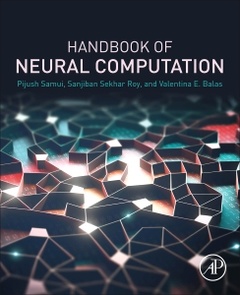Description
Handbook of Neural Computation
Coordinators: Samui Pijush, Roy Sanjiban Sekhar, Emilia Balas Valentina
Language: English
Subject for Handbook of Neural Computation:
Support: Print on demand
Description
/li>Contents
/li>Readership
/li>Biography
/li>Comment
/li>
Handbook of Neural Computation explores neural computation applications, ranging from conventional fields of mechanical and civil engineering, to electronics, electrical engineering and computer science. This book covers the numerous applications of artificial and deep neural networks and their uses in learning machines, including image and speech recognition, natural language processing and risk analysis. Edited by renowned authorities in this field, this work is comprised of articles from reputable industry and academic scholars and experts from around the world.
Each contributor presents a specific research issue with its recent and future trends. As the demand rises in the engineering and medical industries for neural networks and other machine learning methods to solve different types of operations, such as data prediction, classification of images, analysis of big data, and intelligent decision-making, this book provides readers with the latest, cutting-edge research in one comprehensive text.
1. Gravitational Search Algorithm With Chaos 2. Textures and Rough Sets 3. Hydrological time series forecasting using three different heuristic regression techniques 4. A reflection on image classifications for forest ecology management: Towards landscape mapping and monitoring 5. An Intelligent Hybridization of ABC and LM Algorithms with Constraint Engineering Applications 6. Network Intrusion Detection Model based on Fuzzy-Rough Classifiers 7. Efficient System Reliability Analysis of Earth Slopes Based on Support Vector Machine Regression Models 8. Predicting Short-Term Congested Traffic Flow on Urban Motorway Networks 9. Object Categorization Using Adaptive Graph-based Semi-supervised Learning 10. Hemodynamic Model Inversion by Iterative Extended Kalman Smoother 11. Improved Sparse Approximation Models for Stochastic Computations 12. Symbol Detection in Multiple Antenna Wireless Systems via Ant Colony Optimization 13. Application of particle swarm optimization to solve robotic assembly line balancing problems 14. The cuckoo optimization algorithm and its applications 15. Hybrid Intelligent Model Based on Least Squared Support Vector Regression and Artificial Bee Colony Optimization for Time Series Modeling and Forecasting Horizontal Displacement of Hydropower Dam 16. Modelling the axial capacity of bored piles using multi-objective feature selection, functional network and multivariate adaptive regression spline 17. Transient stability constrained optimal power flow using chaotic whale optimization algorithm 18. Slope Stability Evaluation Using Radial Basis Function Neural Network, Least Squares Support Vector Machines, and Extreme Learning Machine 19. Alternating Decision Trees 20. Scene Understanding Using Deep Learning 21. Deep Learning for Coral Classification 22. A Deep Learning Framework for Classifying Mysticete Sounds 23. Unsupervised deep learning for data-driven reliability and risk analysis of engineered systems 24. Applying Machine Learning Algorithms in Landslide Susceptibility Assessments 25. MDHS-LPNN: A hybrid FOREX predictor model using a Legendre polynomial Neural Network with a Modified Differential Harmony Search technique 26. A Neural Model of Attention and Feedback for Computing Perceived Brightness in Vision 27. Support Vector Machine: Principles, Parameters and Applications 28. Evolving Radial Basis Function Networks using Moth-Flame Optimizer 29. Application of Fuzzy Methods in Power system Problems 30. Application of Particle Swarm Optimization Algorithm in Power system Problems 31. Optimum Design of Composite Steel-Concrete Floors Based on a Hybrid Genetic Algorithm 32. A Comparative Study of Image Segmentation Algorithms and Descriptors for Building Detection 33. Object-Oriented Random Forest for High Resolution Land Cover Mapping Using Quickbird-2 Imagery
Dr. Pijush Samui is a Professor, in the Department of Civil Engineering, at NIT Patna, India, and Guest Professor at University of Science and Technology Beijing. He received his PhD in Geotechnical Engineering from the Indian Institute of Science Bangalore in 2008. His research interests include geohazards; earthquake geotechnical engineering; concrete technology, pile foundation and slope stability and application of AI in civil engineering. He has published more than 21 books, 32 book chapters and over 200 research papers in high impact factor journals as well as 30 conference proceedings.
Sanjiban Sekhar Roy is an Associate Professor in the School of Computer Science and Engineering, Vellore Institute of Technology. He joined VIT in the year 2009 as an Asst. Professor. His research interests include Deep Learning and advanced machine learning. He has published around 50 articles in a reputed international journal (with SCI impact factors) and conferences. He also is editorial board members to a handful of international journals and reviewer to many highly reputed journals such as Neural processing letters, Springer , IEEE Access: The Multidisciplinary Open Access Journal, Computers & Security, Elsevier , International Journal of Advanced Intelligence Paradigms, Inderscience International publishers, International Journal of Artificial Intelligence and Soft Computing, Inderscience International publishers,Ad Hoc Networks, Elsevier, Evolutionary Intelligence, Springer, Journal of Ambient Intelligence and Humanized Computing, Springer, Iranian Journal of Science and Technology, Transactions of Electrical Engineering, Springer. He uses Deep Learning and machine learning techniques to solve many complex engineering problems, especially those are related to imagery. He is specialized in deep convolutional neural networks and generative adversarial network. Dr. Roy also has edited many books with reputed international publishers such as Elsevier, Springer an
- Features high-quality research articles on multivariate adaptive regression splines, the minimax probability machine, and more
- Discusses machine learning techniques, including classification, clustering, regression, web mining, information retrieval and natural language processing
- Covers supervised, unsupervised, reinforced, ensemble, and nature-inspired learning methods

